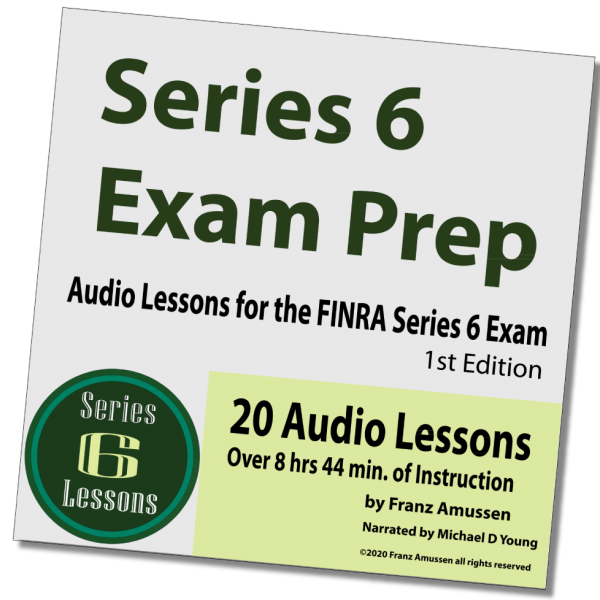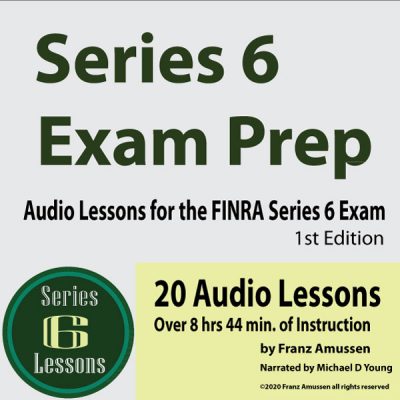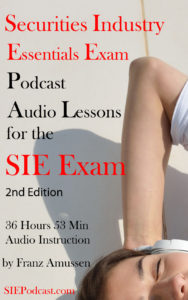Series 6 Lesson 7 Time Horizon
In Series 6 Lesson 7 we discuss Time Horizon
Time Horizon
You have to think about the time horizon of your investments. The longer the time horizon the more volatility the person who is investing can withstand. The longer you have, the more you a risk and vice versa. If you only have a few years, it is probably good to stay out of the stock market, but if you have a longer timeframe, the stock market can be a better choice, because you can withstand more volatility. If you are a young investor trying to invest so that you will have retirement money, they can take more risks that will have ups and downs, because they have more time to recoup potential losses. If you are older and are using investments for income, you will need to have lower-risk investments.
Three Major Factors
- Investment objective
- Time Horizon
- Risk Tolerance
U.S. Treasury Bonds
These are very safe, but also low yield. There is no risk of default and you are going to get the entire amount at maturity. There are different categories of bonds based on how much time you have. Short term = T-Bills. Mid term = T-Notes Long term = T-Bonds. T-STRIPS are bought at a deep discount and then they make money when the bond matures by getting the face value back. ($500 price, then matures to $1000).
Non-Marketable Government Securities
Series EE Bonds: Purchased at a discount and redeemed at their face value when they mature. The taxes can be deferred until maturity or they can be converted into HH Bonds.
Series HH Bonds: These can only be purchased by converting Series EE Bonds at maturity. They pay semi-annual interest, and they can be redeemed for their face value at any time.
I-Bonds
This is issued by the U.S. Treasury, which means that it is backed and exempt from state and local income taxes. It has a guaranteed rate, which can rise if inflation rises. The interest is added to the value of the bond, which means taxes can be deferred. If you use the proceeds for education costs, then the income is tax free. (Has to be within the same year as the redemption of the bonds)
All of these types of bonds are “non-marketable”, which means that they cannot be traded. That is why they are sometimes called “Savings Bonds”
Municipal Bonds
A municipality is any state or local government. (school district, park districts, etc) These are bond issued by these governments. They pay tax-free interest to investors. This means that they pay lower rates than corporate bonds, but you will still probably come out ahead, because you do not have to pay taxes. You can be taxed by other governments that did not issue the bond, but not by the issuing government.
Mortgage Backed Securities
Mortgages are pooled together and packaged and then sold to investors. These investors get interest and principal payments from that pool. These debts are eventually paid off and might even be paid off earlier than scheduled, which is known as prepayment risk.
GNMA is the Government National Mortgage Association, sometimes Ginne Mae. If you buy a pass-through certificate from GNMA, you get a mortgage-backed security that is backed by the U.S. Treasury.
FNMA is sometimes called Fannie Mae and if you buy through them, the U.S. Treasury is not required to bail out investors, but it can choose to do so.
CMO
This is a collateralized mortgage obligation It also gets value from mortgages and mortgage-backed securities that are called tranches, which are grouped by when they mature. (become amortized)
REMIC
This is a Real Estate Mortgage Investment Conduit. This is another kind of mortgage backed pass-through vehicle. They are separated into different risk classes, not different maturity classes.
Money Market Securities
Money market are debt securities, not including stock, that are going to mature in a year or less. These are securities that are highly liquid. They pay short-term interest rates, so if you only have a short time, you can put your money in the money market securities, which means you should get your money back plus some interest.
We also offer lessons for:
The Series 7 Exam
https://gumroad.com/l/ILYu
The Series 22 Exam
https://series6lessons.com/series-22-exam/
The Series 63 Exam
https://series6lessons.com/series-63-exam-lessons/
The Life Health Insurance Exam
https://series6lessons.com/insurance-lessons/
The SIE Exam (Securities Industries Essentials Exam)
https://series6lessons.com/finra-sie/
Click on any of them to find out more
Podcast: Play in new window | Download (Duration: 10:52 — 4.5MB)
Subscribe: Apple Podcasts | RSS | Subscribe to Podcast




